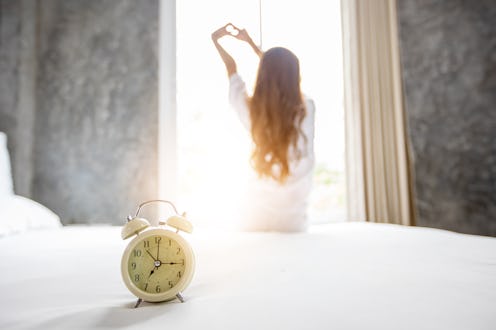
The days are about to get shorter as Daylight Saving Time 2019 comes to an end Nov. 3 at 2 a.m. local time. Also known as Fall Back, the end of Daylight Saving Time means an hour less sunlight each evening, which could contribute to seasonal affective disorder (SAD), or seasonal depression. And understanding what exactly sunlight does to your brain can help explain why you might prefer longer days to shorter, darker ones.
According to a 2018 Chinese study published in the journal Cell, there's a correlation between exposure to sunlight and improved memory and mood. In addition, a 2009 study published in the journal Environmental Health suggests that exposure to sunlight could improve cognitive function, the brain's ability to process thoughts and complete tasks, especially in people who experience depression. But not everyone necessarily gets all the sunlight they wish they did. Depending on where you live, and your work schedule, you could go days without seeing the sun at all, since some states experience less than six hours of daylight during the winter.
For people who live with SAD or just generally feel out of sorts when the days are shorter, this lack of sunlight could cause psychological distress and physical fatigue. Dr. Sujay Kansagra, M.D., an associate professor at Duke University Medical Center and Mattress Firm’s resident sleep health expert, tells Bustle that exposing yourself to sunlight first thing in the morning can help make you feel more alert. "Don't avoid the light," he says. "Getting plenty of light first thing in the morning will help." This means opening those curtains as soon as you wake up.
Because sunlight sends signals to your brain about when you should sleep, the time change can be confusing for both your body and mind. "Traditionally, our brain relies on sunlight to understand when we should naturally wake up and go to sleep," Dr. Conor Heneghan, Ph.D., lead sleep researcher at Fitbit," tells Bustle. "The end of Daylight Saving Time can have an impact on our sleep and wake schedules, as our internal body clock (circadian rhythm) may be thrown off course. The time shift can also have an impact on how much melatonin the brain and body naturally release, which may make you feel foggy or sluggish throughout the day."
When I lived in Portland, Maine, where the sun often set before 4 p.m. in the winter, I struggled more with depression during the colder months than I did in the summer. In fact, it's such an issue that the University of Southern Maine, where I got my MFA, even offers students the opportunity to borrow light boxes during the winter. According to the Mayo Clinic, they're often recommended for people dealing with changes in mood and sleep when Daylight Saving Time ends. "Light therapy is thought to affect brain chemicals linked to mood and sleep, easing SAD symptoms," the Mayo Clinic explained on its site. "Using a light therapy box may also help with other types of depression, sleep disorders and other conditions."
It recommends light therapy lamps designed to filter out harmful ultraviolet light, which can cause skin and eye damage. The Mayo Clinic also cautioned people living with bi-polar disorder to talk with their doctors before using a light box, because it can trigger mania in some people.
Aside from light therapy, Dr. Kansagra says it's important to ensure you don't disrupt your sleep by exposing yourself to artificial light at night. "Light from the environment is the main signal to your brain's clock," he explains. "Too much light at night and the brain wants to stay up even later. This includes light from TVs and smartphones."
In order to mitigate the effects of the end of Daylight Saving Time on your body and brain, Dr. Heneghan recommends keeping a consistent sleep and wake schedule. "Fitbit’s analysis shows that while bedtimes typically vary by 64 mins on average per night, people with more consistent bedtimes tend to sleep longer," he explains. "Fitbit also found that typically, people lose an average of 30 minutes of sleep in the spring and gain 30 minutes on the fall switch back to winter."
In addition, you can make your room a sleep zone by investing in blackout curtains, a sleep mask, and a sunrise alarm clock that simulates dawn to wake you up naturally. Because reduced exposure to sunlight could negatively affect your mood, it's important to do everything you can to set yourself up for success.
Experts:
Dr. Sujay Kansagra, M.D., neurologist and sleep medicine doctor, associate professor at Duke University Medical Center, and program director of the Pediatric Neurology Residency Program, director of the Duke Pediatric Neurology Sleep Medicine Program
Dr. Conor Heneghan, Ph.D., sleep scientist and lead sleep researcher at Fitbit
Studies referenced:
Zhu, Hongying et al.Cell, Volume 173, Issue 7, 1716 - 1727.e17 Moderate UV Exposure Enhances Learning and Memory by Promoting a Novel Glutamate Biosynthetic Pathway in the Brain. doi: 10.1016/j.cell.2018.04.014
Shia T Kent, Leslie A McClure, William L Crosson, Donna K Arnett, Virginia G Wadley, Nalini Sathiakumar. Effect of sunlight exposure on cognitive function among depressed and non-depressed participants: a REGARDS cross-sectional study. Environ Health. 2009; 8: 34. Published online 2009 Jul 28. doi: 10.1186/1476-069X-8-34